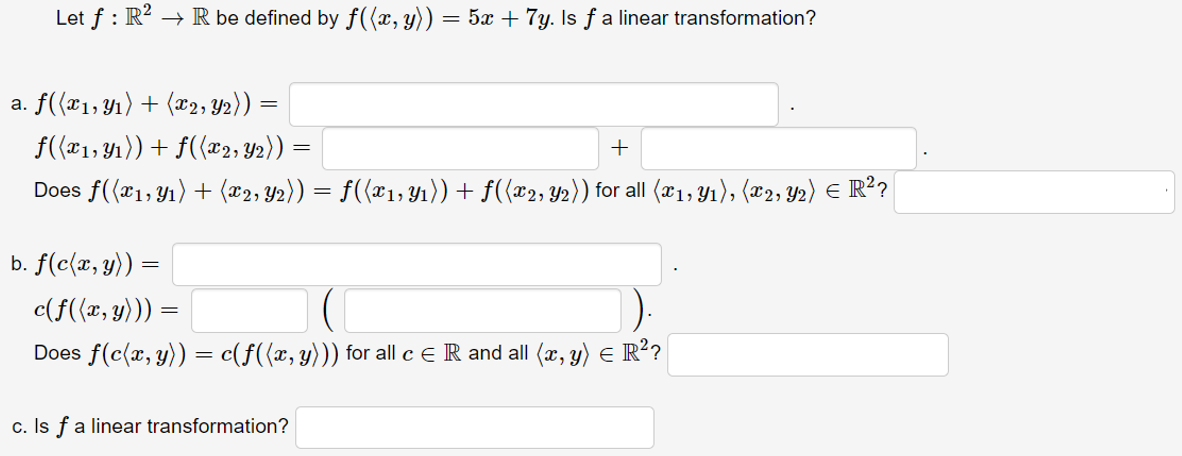Let † : R- → R be defined by f((x, Y)) = 5x + 7Y. Is ja linear transformation? (®1, Y1) + (x2, Y2)) %3D (®1, Y1)) + f(x2, Y2)) = + es f({¤1,Y1) + (x2, Y2)) = f((x1,Y1)) + f({x2, Y2)) for all (®1, Y1), (æ2, Y2) E R? c(x, y)) = f(x, y))) = mes f(c(x, y)) = c(f({x,y))) for all ce R and all (x, y) e R?
Let † : R- → R be defined by f((x, Y)) = 5x + 7Y. Is ja linear transformation? (®1, Y1) + (x2, Y2)) %3D (®1, Y1)) + f(x2, Y2)) = + es f({¤1,Y1) + (x2, Y2)) = f((x1,Y1)) + f({x2, Y2)) for all (®1, Y1), (æ2, Y2) E R? c(x, y)) = f(x, y))) = mes f(c(x, y)) = c(f({x,y))) for all ce R and all (x, y) e R?
Linear Algebra: A Modern Introduction
4th Edition
ISBN:9781285463247
Author:David Poole
Publisher:David Poole
Chapter6: Vector Spaces
Section6.4: Linear Transformations
Problem 12EQ
Related questions
Question

Transcribed Image Text:Let f : R? → R be defined by f((x, y)) = 5x + 7y. Is f a linear transformation?
a. f({x1, Y1) + (x2, Y2)) =
f(*1, Y1)) + f({x2; Y2)) =
+
Does f((*1, Y1) + (æ2, Y2)) = f((x1;Yı))+ f({x2; Y2)) for all (x1, Y1), (x2; Y2) e R?
b. f(c(x, y))
c(f({x, y))) =
Does f(c(x, y)) = c(f({x, y))) for all c e R and all (x, y) E R?
c. Is fa linear transformation?
Expert Solution
This question has been solved!
Explore an expertly crafted, step-by-step solution for a thorough understanding of key concepts.
Step by step
Solved in 4 steps

Recommended textbooks for you

Linear Algebra: A Modern Introduction
Algebra
ISBN:
9781285463247
Author:
David Poole
Publisher:
Cengage Learning

Elementary Linear Algebra (MindTap Course List)
Algebra
ISBN:
9781305658004
Author:
Ron Larson
Publisher:
Cengage Learning

Linear Algebra: A Modern Introduction
Algebra
ISBN:
9781285463247
Author:
David Poole
Publisher:
Cengage Learning

Elementary Linear Algebra (MindTap Course List)
Algebra
ISBN:
9781305658004
Author:
Ron Larson
Publisher:
Cengage Learning